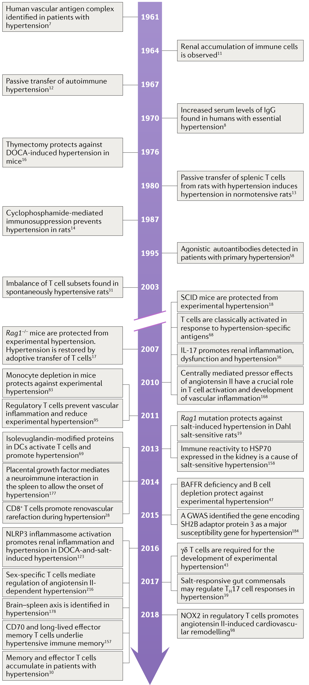Nature Reviews Immunology ( IF 67.7 ) Pub Date : 2019-04-16 , DOI: 10.1038/s41577-019-0160-5 Grant R Drummond 1 , Antony Vinh 1 , Tomasz J Guzik 2, 3 , Christopher G Sobey 1

|
Hypertension affects 30% of adults and is the leading risk factor for heart attack and stroke. Traditionally, hypertension has been regarded as a disorder of two systems that are involved in the regulation of salt–water balance and cardiovascular function: the renin–angiotensin–aldosterone system (RAAS) and the sympathetic nervous system (SNS). However, current treatments that aim to limit the influence of the RAAS or SNS on blood pressure fail in ~40% of cases, which suggests that other mechanisms must be involved. This Review summarizes the clinical and experimental evidence supporting a contribution of immune mechanisms to the development of hypertension. In this context, we highlight the immune cell subsets that are postulated to either promote or protect against hypertension through modulation of cardiac output and/or peripheral vascular resistance. We conclude with an appraisal of knowledge gaps still to be addressed before immunomodulatory therapies might be applied to at least a subset of patients with hypertension.
中文翻译:

高血压的免疫机制
高血压影响 30% 的成年人,是心脏病发作和中风的主要危险因素。传统上,高血压被认为是参与调节盐水平衡和心血管功能的两个系统的疾病:肾素-血管紧张素-醛固酮系统(RAAS)和交感神经系统(SNS)。然而,目前旨在限制 RAAS 或 SNS 对血压影响的治疗在约 40% 的病例中失败,这表明必须涉及其他机制。本综述总结了支持免疫机制对高血压发展的贡献的临床和实验证据。在这种情况下,我们强调了通过调节心输出量和/或外周血管阻力来促进或预防高血压的免疫细胞亚群。最后,我们评估了在免疫调节疗法可能应用于至少一部分高血压患者之前仍有待解决的知识差距。















































 京公网安备 11010802027423号
京公网安备 11010802027423号